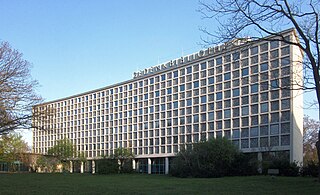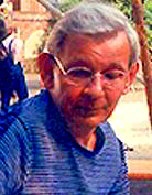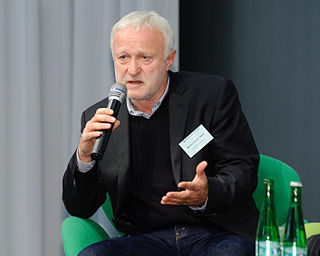
Karl Jost Henkel (1909 - 1961) was a German entrepreneur and grandson of Fritz Henkel. He headed the Henkel Group from 1938 until his death. [1]

Karl Jost Henkel (1909 - 1961) was a German entrepreneur and grandson of Fritz Henkel. He headed the Henkel Group from 1938 until his death. [1]
Henkel was born on 27 July 1909 in Dusseldorf, then in the German Empire.
After graduating from Rethel Gymnasium in Düsseldorf in 1928, Henkel completed a commercial apprenticeship in Bremen from 1928 to 1930. From 1930 to 1932, he studied economics at the universities of Bonn, Berlin and Hamburg, graduating with a diploma. From 1932 to 1934, he received his doctorate from the University of Cologne. At the same time, from 1933 to 1934, he worked in the field service of the Henkel company. This was followed by studies in the US from 1934 to 1935.
Jost Henkel joined the Industrie-Club Düsseldorf in 1938. [2] He was later appointed Wehrwirtschaftsführer in the National Socialist German Reich.
From 1938, he became managing director of the company together with Carl August Bagel and Werner Lüps, and on 11 July 1942, he was elected "Betriebsführer der Henkel-Werke" as successor to the late Werner Lüps. [3] In 1945, Jost Henkel was imprisoned by the Allies and returned to the company together with other family members in November 1947. [3] In December 1947, he was appointed ordinary managing director. [4]
In 1950 he became a full managing director. In 1958, he established the Dr. Jost Henkel Foundation. In 1959, he became Chairman of the Supervisory Board and a member of the Advisory Board of Henkel & Cie GmbH.
From 1959, he was active in the German Chemical Industry Association. There, he took on board duties and was a member of the Main Committee and the Presidial Committee.
Henkel had played tennis in his youth and in 1937, he became Chairman of the Düsseldorf Rochus Club. From 1949 to 1953, he was Chairman of the Tennis Association of the Lower Rhine, and from 1952 to 1958, he was President of the German Tennis Federation. [5]
Henkel died of pneumonia in 1961 at the age of 51. [6] After his death, his younger brother Konrad took over the management of the Henkel Group.
He died on 7 July 1961 in Duseldof.
In 1958, Henkel was awarded the Grand Federal Cross of Merit for his services. The city of Berlin awarded him as the first industrialist, the Berlin Liberty Bell for his services to the city.

Norbert Blüm was a German politician who served as a federal legislator from North Rhine-Westphalia, chairman of the CDU North Rhine-Westphalia (1987–1999), and Minister of Labour and Social Affairs.

Heinrich Ernst Otto "Henner" Henkel was a German tennis player during the 1930s. His biggest success was his singles title at the 1937 French Championships.

The German Tennis Federation is the governing body of tennis federations and clubs in Germany.

Fritz Bornemann was a German architect.

Felix Rexhausen was a German journalist, editor and author. As a journalist, he wrote for Kölner Stadt-Anzeiger, Westdeutscher Rundfunk, and the magazines Die Zeit and Der Spiegel.

The Deutsche Freischar – Bund der Wandervögel und Pfadfinder (DF) is a German youth organization. Originating from the merger of several small Wandervogel and Scouting groups, it was one of the largest and most important associations of the Bündische Jugend of the Weimar Republic besides the Deutscher Pfadfinderbund and Reichsschaft Deutscher Pfadfinder.

The National Socialist League of the Reich for Physical Exercise was the umbrella organization for sports and physical education in Nazi Germany. The NSRL was known as the German League of the Reich for Physical Exercise until 1938. The organization was expanded to Austria after that country's annexation by Nazi Germany.

Wenzel Jaksch was a Sudeten German Social Democrat politician and the president of the Federation of Expellees in 1964 to 1966.
Hilmar Kopper was a German banker and former chairman of the Board of Deutsche Bank (1989–1997).

Georg Felix Ritter von Metaxa was an Austrian tennis player active in the 1930s.
Karl Heinz Stroux was a German actor, film and theatre director, and theatre manager. As the director of the Düsseldorfer Schauspielhaus from 1955 to 1972 he opened the new building in 1970.

Elmar Pieroth was a German politician (CDU). The businessman was a member of the Bundestag from 1969 until 1981. He was the senator for economic affairs in Berlin from 1981 until 1989 and from 1996 until 1998, as well as the Senator of Finance from 1991 until 1996.

Carl August von der Meden was the first president of the Deutscher Tennis Bund and was called the Father of lawn tennis in Germany.

The Deutscher Pfadfinderbund (DPB) was the first German Scouting association, and the forerunner of the Deutscher Pfadfinderbund (1945). It existed from 1911 until 1933, when it was disbanded by the National Socialists.

Karl-Günther von Hase was a German diplomat and Secretary of state. As head of the Press and Information Office of the Federal Government, he served as spokesman of government under three chancellors. He was ambassador to the United Kingdom from 1970 to 1977. He was then Director General of the ZDF, a German public-service television broadcaster, retiring in 1982.

Werner Gustav Schulz was a German politician of Alliance '90/The Greens. Trained in food technology at the Humboldt University of Berlin, he worked as a research assistant. He was an activist for peace ecology and human rights in several oppositional groups from the 1970s. He lost his university job in 1980 when he protested against the Soviet Invasion of Afghanistan. In the Peaceful Revolution, he was in 1989 a founding member of the New Forum, representing the group at the Round Table. He was elected to the first freely Volkskammer. After German reunification, he was a member of the German Bundestag from 1990 to 2005, and a member of the European Parliament (MEP) from 2009 to 2014.
Gottfried Hinze was a German businessman, athlete, and football administrator. He was President of the German Football Association from 1905 to 1925.

Hugo Wilhelm Henkel was a German chemist and industrialist. He went down in history as the inventor of the Persil detergent.

Konrad Henkel was a German chemist and industrialist, and long-time head of the Henkel Group.
Dietrich Erdmann was a German composer and University lecturer.